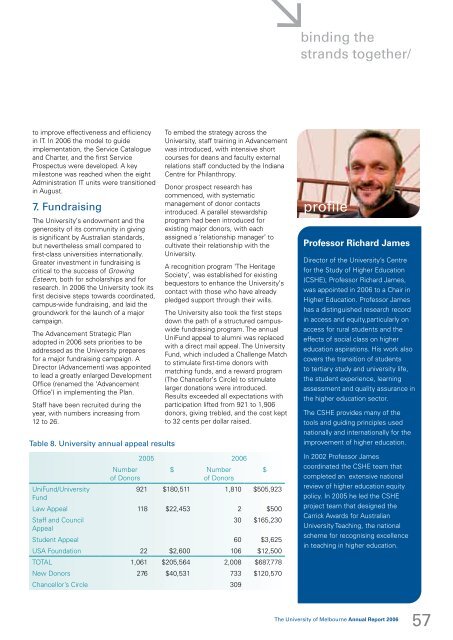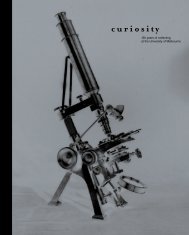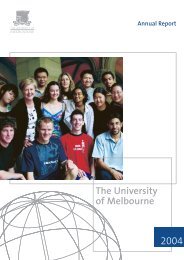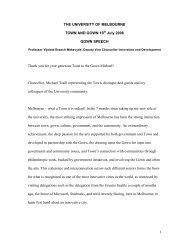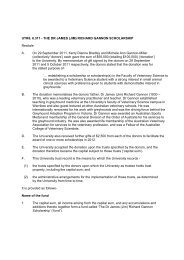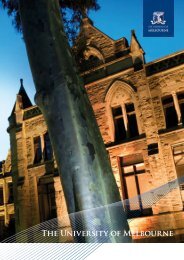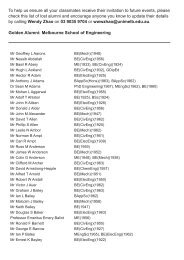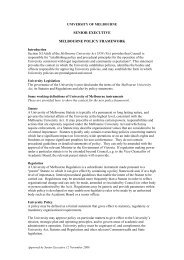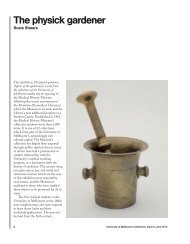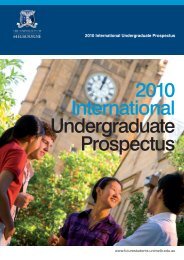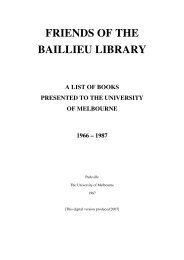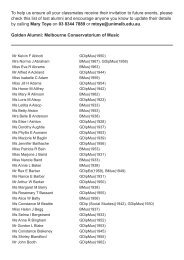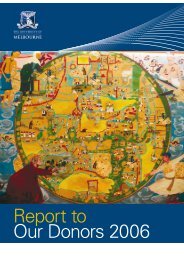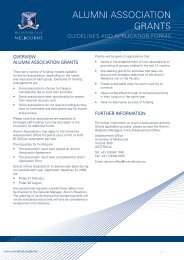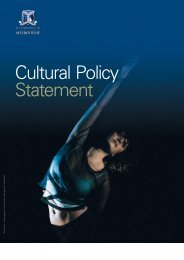annual report/2006 - University of Melbourne
annual report/2006 - University of Melbourne
annual report/2006 - University of Melbourne
Create successful ePaper yourself
Turn your PDF publications into a flip-book with our unique Google optimized e-Paper software.
inding the<br />
strands together/<br />
to improve effectiveness and efficiency<br />
in IT. In <strong>2006</strong> the model to guide<br />
implementation, the Service Catalogue<br />
and Charter, and the first Service<br />
Prospectus were developed. A key<br />
milestone was reached when the eight<br />
Administration IT units were transitioned<br />
in August.<br />
7. Fundraising<br />
The <strong>University</strong>’s endowment and the<br />
generosity <strong>of</strong> its community in giving<br />
is significant by Australian standards,<br />
but nevertheless small compared to<br />
first-class universities internationally.<br />
Greater investment in fundraising is<br />
critical to the success <strong>of</strong> Growing<br />
Esteem, both for scholarships and for<br />
research. In <strong>2006</strong> the <strong>University</strong> took its<br />
first decisive steps towards coordinated,<br />
campus-wide fundraising, and laid the<br />
groundwork for the launch <strong>of</strong> a major<br />
campaign.<br />
The Advancement Strategic Plan<br />
adopted in <strong>2006</strong> sets priorities to be<br />
addressed as the <strong>University</strong> prepares<br />
for a major fundraising campaign. A<br />
Director (Advancement) was appointed<br />
to lead a greatly enlarged Development<br />
Office (renamed the ‘Advancement<br />
Office’) in implementing the Plan.<br />
Staff have been recruited during the<br />
year, with numbers increasing from<br />
12 to 26.<br />
Table 8. <strong>University</strong> <strong>annual</strong> appeal results<br />
UniFund/<strong>University</strong><br />
Fund<br />
Number<br />
<strong>of</strong> Donors<br />
To embed the strategy across the<br />
<strong>University</strong>, staff training in Advancement<br />
was introduced, with intensive short<br />
courses for deans and faculty external<br />
relations staff conducted by the Indiana<br />
Centre for Philanthropy.<br />
Donor prospect research has<br />
commenced, with systematic<br />
management <strong>of</strong> donor contacts<br />
introduced. A parallel stewardship<br />
program had been introduced for<br />
existing major donors, with each<br />
assigned a ‘relationship manager’ to<br />
cultivate their relationship with the<br />
<strong>University</strong>.<br />
A recognition program ‘The Heritage<br />
Society’, was established for existing<br />
bequestors to enhance the <strong>University</strong>’s<br />
contact with those who have already<br />
pledged support through their wills.<br />
The <strong>University</strong> also took the first steps<br />
down the path <strong>of</strong> a structured campuswide<br />
fundraising program. The <strong>annual</strong><br />
UniFund appeal to alumni was replaced<br />
with a direct mail appeal. The <strong>University</strong><br />
Fund, which included a Challenge Match<br />
to stimulate first-time donors with<br />
matching funds, and a reward program<br />
(The Chancellor’s Circle) to stimulate<br />
larger donations were introduced.<br />
Results exceeded all expectations with<br />
participation lifted from 921 to 1,906<br />
donors, giving trebled, and the cost kept<br />
to 32 cents per dollar raised.<br />
2005 <strong>2006</strong><br />
$ Number<br />
<strong>of</strong> Donors<br />
921 $180,511 1,810 $505,923<br />
Law Appeal 118 $22,453 2 $500<br />
Staff and Council<br />
Appeal<br />
$<br />
30 $165,230<br />
Student Appeal 60 $3,625<br />
USA Foundation 22 $2,600 106 $12,500<br />
TOTAL 1,061 $205,564 2,008 $687,778<br />
New Donors 276 $40,531 733 $120,570<br />
Chancellor’s Circle 309<br />
pr<strong>of</strong>ile<br />
Pr<strong>of</strong>essor Richard James<br />
Director <strong>of</strong> the <strong>University</strong>’s Centre<br />
for the Study <strong>of</strong> Higher Education<br />
(CSHE), Pr<strong>of</strong>essor Richard James,<br />
was appointed in <strong>2006</strong> to a Chair in<br />
Higher Education. Pr<strong>of</strong>essor James<br />
has a distinguished research record<br />
in access and equity,particularly on<br />
access for rural students and the<br />
effects <strong>of</strong> social class on higher<br />
education aspirations. His work also<br />
covers the transition <strong>of</strong> students<br />
to tertiary study and university life,<br />
the student experience, learning<br />
assessment and quality assurance in<br />
the higher education sector.<br />
The CSHE provides many <strong>of</strong> the<br />
tools and guiding principles used<br />
nationally and internationally for the<br />
improvement <strong>of</strong> higher education.<br />
In 2002 Pr<strong>of</strong>essor James<br />
coordinated the CSHE team that<br />
completed an extensive national<br />
review <strong>of</strong> higher education equity<br />
policy. In 2005 he led the CSHE<br />
project team that designed the<br />
Carrick Awards for Australian<br />
<strong>University</strong> Teaching, the national<br />
scheme for recognising excellence<br />
in teaching in higher education.<br />
The <strong>University</strong> <strong>of</strong> <strong>Melbourne</strong> Annual Report <strong>2006</strong><br />
57


